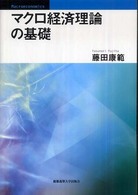出版社内容情報
束縛条件違反として捉えられてきた非同一指示効果の中に反意識主体照応制約違反によるものがあることを示し束縛条件の適用範囲を再考自然言語における非同一指示効果には、束縛条件に起因するものと反意識主体照応制約に起因するものがある。しかし、とりわけ後者に関しては、どのような条件下で生起するかがほとんど明らかにされていない。本書は、従来、束縛条件違反として捉えられてきた非同一指示効果の中に反意識主体照応制約違反によるものがあることを示し、反意識主体照応制約の適用条件を明らかにするとともに、束縛条件の適用範囲を再考する。
八島 純[ヤシマ ジュン]
専修大学講師。カリフォルニア大学ロサンゼルス校 (UCLA)言語学科博士課程修了。2015年にUCLAから言語学の博士号を取得。主な論文: On the apparent unbindability of overt third-person pronouns in Japanese(Natural Language and Linguistic Theory 33, 2015)、Reference-set computation in children: Mandarin speaking children's pronoun interpretation in Avoid Pronoun contexts (Language Acquisition 21, 2014)。
目次
1 Overview of this Book
2 Between the Binding Theory and Logophoricity(Binding Theory;Challenges to the Binding Theory ほか)
3 Concealed Antilogophoricity:A Case Study of Japanese Pronominal Binding(Overt third‐person pronouns in Japanese;Basic Facts ほか)
4 Antilogophoricity and the Scope of Condition C(Condition C and Antilogophoricity;Names as Maximal Antilogophors ほか)
5 Conclusion






